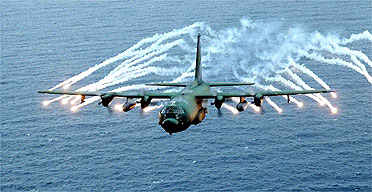Just another act of terrorist aggression.
 Why is it that whenever the need to strike out against ones foes becomes paramount is it that those damn civilians always seem to get in the way? Another 7 civilians were slaughtered by the United States on Sunday, in what has hardly been unfairly described by the Syrians as an act of "criminal and terrorist aggression". Throughout the last couple of months more and more Predator air drones, piloted back in cosy United States control rooms, have brought swift death to the tribal areas of Pakistan, routinely killing civilians, as well as or instead of those that they were targeting. Now Syria has become the latest victim to start bleeding.
Why is it that whenever the need to strike out against ones foes becomes paramount is it that those damn civilians always seem to get in the way? Another 7 civilians were slaughtered by the United States on Sunday, in what has hardly been unfairly described by the Syrians as an act of "criminal and terrorist aggression". Throughout the last couple of months more and more Predator air drones, piloted back in cosy United States control rooms, have brought swift death to the tribal areas of Pakistan, routinely killing civilians, as well as or instead of those that they were targeting. Now Syria has become the latest victim to start bleeding.Reputedly aimed at killing Abu Ghadiya, an ISI operative smuggling foreign fighters into Iraq, the images that flashed round the Middle East were undoubtedly those of the innocents caught in the crossfire, that the United States has typically made no comment on. The obvious question, like on the previous post, is why now? After all, while there once most certainly was problems along Syria's border, with foreign fighters able to more or less come and go as they pleased, not only have those wanting to fight their holy war instead increasingly plumped to go to Afghanistan or Pakistan, or one of the other theatres, abandoning Iraq as the "Islamic State" has been diminished, but Syria itself has clamped down on the practice, with even the Americans themselves admitting such. The intelligence this time round may well have been overwhelming, but has it not also been over the past 5 years, especially when disrupting the foreign fighters would have had far more of an impact?
For all the talk of legal justifications for the strike, there was just the one reason why this went ahead, just as it also the reason why the number of strikes within Pakistan has increased: both countries are becoming weaker, and while Pakistan is an ally and therefore unlikely to respond, Syria is simply unable to respond. Bashar al-Assad has faced one setback after another, with the loss of face increasing each time. While it is still disputed who killed Rafik Hariri, the withdrawal of the Syrian security apparatus from Lebanon was the undoubted result. Over the last few years, Syria's hosting of Hamas and Hizbullah and relationship with Iran has started to pall; being part of the second half of the "axis of evil" is taking its toll. Syria's hosting of the hundreds of thousands if not more Iraqi refugees has put serious constraints on the country's finances, further pushing it towards reconciliation with Israel and renewed although secret talks over the Golan Heights. The Israeli strike against the alleged nuclear facility, followed by the assassination of Imad Mughniyeh, has only further pushed the state towards a deal and a form of peace. The implication that what could follow is attacks on fighters being trained in Iran is therefore wishful thinking, because Iran has both the means and will to respond, overwhelmingly
Sunday's strike will then hardly change anything in the long term as far as Syria itself is concerned. It would also be too nice to believe though that the outbreak of cross-border attacks is a symptom of the last days of the Bush adminstration. Even if we assume that Obama wins the presidency next Tuesday, there is little to suggest that he will order any drastic change in military policy, especially towards Pakistan, considering he has personally raised the spectre of increasing activity within that country. Pakistan itself is caught in the middle: looking for peace while knowing that any ceasefire is destined to be only temporary, with a foreign power that cares nothing for any internal deals and only for what might be being hatched in its autonomous regions. Whilst it may be that the US military is striking now before the change takes place as a contingency plan, there's more than a hint, as Juan Cole alludes to, of this being staged as a sop to McCain to show that Iraq is not over yet. There are also the domestic issues within Iraq itself to be considered, as a deal over keeping the US forces in the country post the end of the year continues to be fought over. A shot across the bows to suggest to the Iraqi politicians themselves that whatever they decide, the US will reserve the right, as ever, to do whatever the hell it pleases?
Whatever the case may be, innocents have once again been killed for no great reason. Again, for no great gain anti-Americanism has been inflamed. Again, those recruiting to extremist causes will be praising the actions of those that care only for the short-term. And no one has any hope that this will be anything like the end of it.
Labels: foreign policy, Iraq, Syria, terror, United States foreign policy, US air strikes


